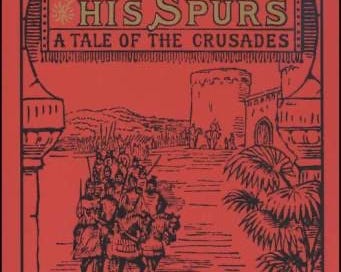If you are looking for the beginning of the study for G. A. Henty’s Winning His Spurs then you can go HERE for a brief introduction. At the bottom of the introduction you will find the links to each section of the study guide as it becomes available. If you would like to see the growing list of book studies available for free on this site you can go HERE. Enjoy!
Virtues/Vices/Great Ideas: (Find them in the Text)
Friendship, Betrayal, Needing a Guide, Hospitality, Deception, Perseverance, Fortitude, Goodness, Recklessness, Love
Grammar Questions: (The Information of the Text)
What trouble was brewing for King Richard, back in England, while he was crusading in the Holy Land?
What agreement did King Richard and Sultan Saladin come to?
Describe the relationship between Richard and Saladin by the end of the Crusade.
What circumstances caused great difficulty for King Richard, Cuthbert, and the rest of the English as they sought to regain their homeland?
What difficult path did Cuthbert and his men take on their way back to England?
From what dangerous situation did Cuthbert and his men rescue Baron Ernest?
How did Baron Ernest, in turn, greatly help Cuthbert?
What did Cnut do which caused Cuthbert to be captured while in Bavaria?
According to the story, why was the baron in Bavaria not inclined to show any mercy to Cuthbert?
How did Cuthbert regain his freedom?
Logic Questions: (Interpreting, Comparing/Contrasting, Reasoning)
Why might Richard and Saladin have liked each other despite being mortal enemies?
Why is King Philip supporting John Lackland in his attempted takeover of the throne of England?
What might be inferred about Cuthbert based upon the counsel he gave to the king (which the king ultimately rejected)?
Why did Cuthbert provide himself with a horse and with finer clothing while his men walked and
What particular danger was Cuthbert referring to when he said, “when sleepiness overpowers the traveler, death is at hand.”
Why would Cuthbert and his men risk their own lives to help a stranger? What does this say about their character?
Compare and contrast Cuthbert and Cnut in this present reading. In what ways are they similar and in what ways are they different? What do you think accounts for those similarities and differences?
Why did Cuthbert not apologize for what Cnut did rather than present a challenge of combat before the baron?
Rhetoric Questions: (The Analysis of Ideas in the Text)
Was it right for Cuthbert to provide himself with a horse and with finer clothing while his men walked and were provided with cheaper garments? Why or why not?
Do you think the actions of Cnut and the other archers, in freeing Cuthbert, were just? Why or why not?
In this reading we see numerous examples of Cuthbert and his men acting out of a sense of honor. Offer a definition for the idea of “honor” and identify one example of it in the current reading. To what extent do you think our actions should be guided by a sense of honor? Can this acting upon a sense of honor ever lead us astray? Give an example of when we should act according to honor and also when acting according to our sense of honor might mislead us.
Theological Analysis: (Sola Scriptura)
Read Exodus 20:12. What does it look like to obey this commandment as a child? Does this commandment change when someone reaches adulthood? Why or why not?



